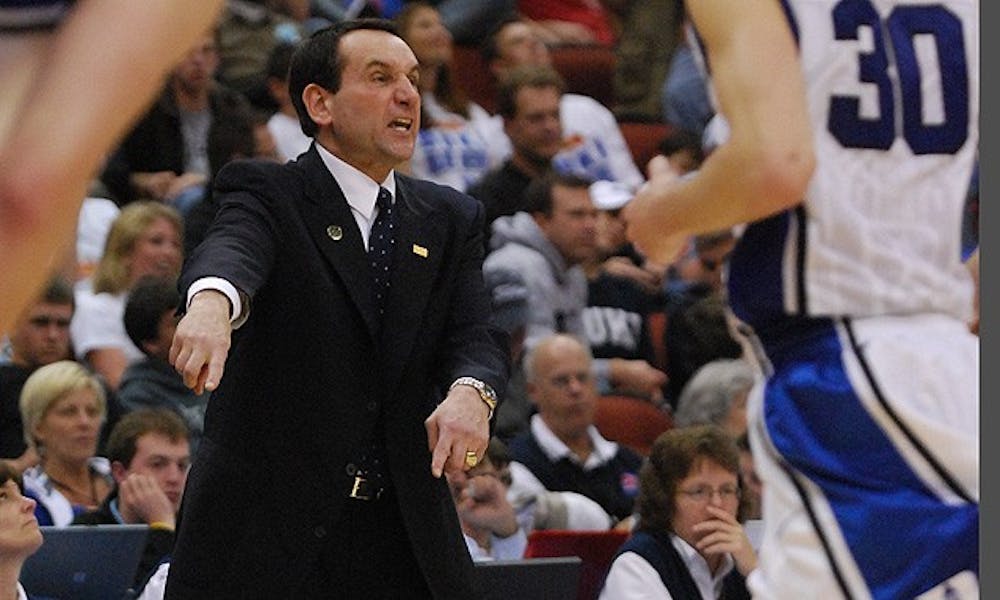Mike Krzyzewski made his triumphant return to campus last night, just days after leading the United States National Team to its fourth FIBA World Championship in Turkey.
And despite the fact that he is now positioned to become arguably the most successful national team coach ever with a gold medal in the 2012 London Games, Americans barely noticed. The news was hidden by NFL game analyses on practically all prominent sports websites, and it was viewed almost as an expected victory rather than a major accomplishment.
Perhaps we didn’t pay attention because the tournament was 5,000 miles away in Turkey or because we simply weren’t willing to care about a non-Olympic international basketball tournament. But whatever the reason, we missed out on one of Krzyzewski’s greatest coaching performances ever.
Team USA’s pursuit of FIBA gold was nothing short of dominant. Save a relatively meaningless group stage two-point victory over Brazil, there was no drama, no controversy, no high intensity moments—unless you include Coach K’s snarky war of words with Russian head coach David Blatt.
No, the Americans hardly broke a sweat in the tournament. They even statistically overpowered their opponents almost as much as the Redeem Team did in 2008, despite playing without many of the stars that made the trip to Beijing.
2008 stats: 8-0 record, average scoring differential of plus-28, and an average of 106 points scored per game while giving up 78.
2010 stats: 9-0 record, average scoring differential of plus-25, 93 points scored per game, 68 points given up.
The obvious difference between the two teams lies in their offensive numbers. But consider the roster turnover that took place between the tournaments.
Chris Paul, Kobe Bryant and LeBron James took the summer off this year, and were replaced by a less talented trio of Derrick Rose, Stephen Curry and Eric Gordon. Two-time NBA Defensive Player of the Year Dwight Howard also sat out. He was filled in by power forward Lamar Odom, who is not even a starting center on his NBA team.
And who’s to blame the NBA’s biggest stars for skipping the tournament? Every year the national team is left to choose between two equally unappealing choices: win, and return home to a country where the achievement is met with a mix of malaise and entitlement, or lose, and incur the wrath of a horde of nitpicky sportswriters and reinvigorated fans.
The success that America has had in international play has been reflected the level its fans at home care about the tournament. Over the 60 years of the FIBA Championships’ existence, the United States has only won the tournament one more time than the former Yugoslavia and Soviet Union, while winning 11 gold medals during that span, far and away the most of any country. Consider that most European countries care more about a FIBA win than Olympic gold in basketball, and the win this weekend is even more impressive.
True, Krzyzewski had Kevin Durant. But the rest of the roster was a rag-tag bunch of internationally inexperienced players, excluding Odom and the 33-year-old Chauncey Billups. Although having Durant meant the team had a go-to scorer, the past has proven that one big star cannot bring home a title.
In 2002, George Karl and Paul Pierce engaged in an infamous feud that sank the USA to sixth place in the first and only World Championship on American soil. 2006 saw more of the same, as Coach K earned just a bronze medal in his national team head coaching debut, with a squad that featured budding superstars James, Carmelo Anthony, Dwyane Wade and Howard.
And even with a team of youngsters, European teams still hold a notable advantage in energy. Americans play an 82-game, seven-month regular season—the longest in all major sports, not including the two-month playoff mini-season—while the Spanish League teams have a 34-game regular season, and Italian Serie A clubs play just 28. Most other European leagues play their seasons in a similar fashion. By the time the World Championships roll around, they have played enough to be at the height of their skill, not run down. When combined with raucous home fans, Europe’s teams were formidable.
America’s win in Turkey was more impressive than we realized. But that fact likely won’t settle in until Coach K takes the international stage again in 2012.
Get The Chronicle straight to your inbox
Signup for our weekly newsletter. Cancel at any time.

